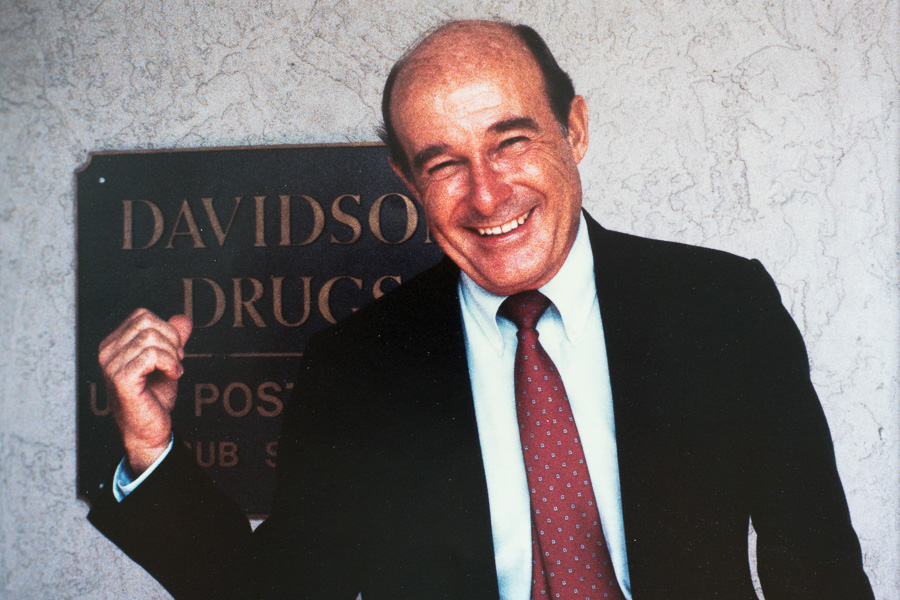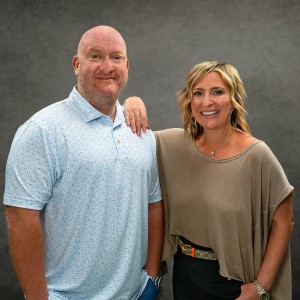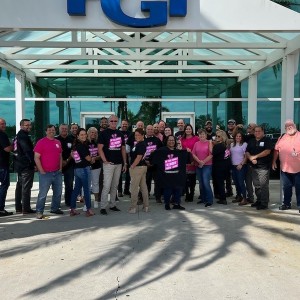There may be no greater testimony to Sarasota’s reputation as a big city with a small-town feel than the independent businesses surviving and thriving on the Gulf Coast—even as chain store competitors roll in. CVS won’t close Davidson Drugs. Whole Foods can’t crush Morton’s Gourmet Market. How have these companies survived the roller-coaster ride of the Florida economy while evading the devouring forces of corporate America and, in some cases, keeping business in the family over generations? SRQ explores these legendary establishments to relish in their respective charms and delights, learning the secrets to keeping the companies both lively and local.
Corner Drug Store
When John B. Davidson attended the University of Colorado, you didn’t find prescription windows in every grocery store. The idea of opening your own business wasn’t just a shared ambition of some students; it was almost an expectation of everybody studying the pharmaceutical trade at the time. “Back when I went, just about everybody who went to pharmaceutical school wanted to own their own pharmacy,” the 85-year-old recalls. “We were all entrepreneurs and didn’t know it.”
Davidson didn’t open his own store immediately out of school but he came close—in the mid-1950s, he took a job as a pharmaceutical representative for Wyeth Laboratories. He moved to Florida in 1956 and traveled a territory extending from Tampa to Everglades City. While meeting with doctors in hospitals and exploring communities all along Florida’s west coast, he found his way to Siesta Key and fell in love with the area. In 1958, he opened the first Davidson Drugs in a 1,600-square-foot space on Ocean Boulevard. Today, there are three locations in operation.
His classes at the University of Colorado didn’t offer much guidance on running an actual store. “Your education was in pharmacy and your street education was in business,” he recalls. He followed the model of many a ‘50s-era drug store, with a soda fountain to entertain the teenagers and a counter to fill scripts. The business immediately developed a customer base, and Davidson Drugs quickly moved out of its humble first location as Davidson, along with business partner Dr. Freeman Ebes, built a shopping center on Ocean Boulevard with a 4,000-square-foot space reserved for the drug store. That location remains in operation today, with Davidson Drugs now filling an 8,000-square-foot space.
The operation would grow with the community. When Sarasota Square Mall opened in 1977, Davidson Drugs was the second leasee. Eventually, Davidson would have up to seven stores in the Sarasota area. Today, three locations remain in operation: the Ocean Boulevard store, a South Siesta Key location and a store in Midtown Plaza. All continue to thrive.
Davidson still calls the Gulf Coast home, though he does spend the hottest months of the year these days in the mountains of North Carolina. Married with six kids and 12 grandchildren, Davidson still has a hand in the business today but runs the stores with sons Richard and Robert. Davidson spends more of his own working hours on his second business love: real estate. Developing the strip center in the 1970s opened a new world to the former drug rep and he ended up building commercial development throughout the region. Along the way, he also helped found the Pelican Press in 1972 and held ownership for 31 years before selling it to the Milwaukee Journal; the paper is now a property of the Observer Group.
Nothing so proudly bears the Davidson brand, of course, as the pharmacies about town, which have continued to operate through waves of chain stores bearing brands like Eckerd, Walgreens, CVS and even counters at Target and Walmart. So how has Davidson survived the wave of chains? In part, the local business is aided by the simple fact that insurance companies set prices for drugs, so costs remain uniform on a prescription whether it gets filled at a Davidson Drugs or through a winder at Publix. “For most people, somebody else is paying for the prescription—insurance, Medicare, whatever,” Davidson says. “We don’t even price prescriptions anymore.” That means Walmart can’t buy truckloads of Amoxycillin to get a bulk rate and then sell it at market-destroying prices the way they can with television sets or action figures.
The biggest competition for Davidson, he says, actually isn’t chains moving up but prescriptions mailing out. Many insurers have started their own mail-order prescription services, and that has started to hurt pharmacy counters across the country.
But Davidson remains confident in one asset at his stores that neither mail-in nor mega-chain companies can offer: “We give better service,” he says. “We typically have better pharmacists. We deliver, have charge accounts and can cater to our customers’ needs.” That face-to-face, everybody-knows-your-name service keeps customers satisfied and coming back to his counters.
Colloquial Convenience
Ali Molavi can tell you the first name of every regular at Short Stop Market. For many, he can tell you the place they work and maybe even a little of the office gossip. For the convenience store owner, it’s important to know the people who keep his business afloat. “We always want to keep hold of our roots,” he says. Of course for long-time residents of Sarasota, this store in Downtown Sarasota represents the community’s history. A convenience store has operated at the Short Stop location now for 50 years, first opening in 1967. Today, the store is literally owned by a mom and pop. While Molavi runs inventory and frequently can be found at the register, wife Jane runs the in-store café that helps set Short Stop apart from hot dog-roller fare in your typical quick shops. In the afternoons, customers may bump into the Molavis’ sons Bijan, 12, and Kamran, 10, who can be seen running around the register. Childhood sweethearts, Ali and Jane say running the business together has afforded them an opportunity stay connected with family full-time.
Jane feels her work in the kitchen makes a big difference in developing loyalty. She cooks up a mix of Middle Eastern dishes, a nod to Ali’s heritage, and European-influenced offerings, based on family dishes she grew up with in her household. But the mix of sandwiches and baked goods changes frequently. “I run this more like a New York bodega,” she says, in that the dishes represent family heritage, serving the workers in nearby offices and residents from neighborhoods and condo buildings with a personal touch. But she firmly believes the store survived this long less because of its wares and more thanks to the personal connection with those who frequent it. She recalls a woman who came into the store this winter whose son had recently passed away, news that prompted Jane to stop her work behind the counter to come console the guest. That’s likely not what a chain gas station employee would do—or even be allowed to do.
While Ali has run this store for 15 years, he’s been connected to convenience stores most of his life. Before living in Sarasota, he and his father ran two Riverview locations for Beverage Station, a drive-in convenience store. And pre-Florida, Ali’s family ran similar companies in Connecticut. But this isn’t necessarily what Ali planned as his own career. A chemical engineer by trade, he finished college shortly after 9/11. While Ali’s family moved here from Iran when he was two years old and he considers himself a “Connecticut kid,” few employers were interested in hiring him to work with volatile products while terrorism dominated headlines. “As much as we hate to admit it, there are a lot of people who are very reluctant hiring anyone of Middle Eastern descent,” he says. But his family background lent him the knowledge to run a solid store. Growing up in a part of New England where virtually every business was family-run, Ali says he’s never felt any temptation to buy a franchise brand. “If you’ve been to the Northeast, everything out there is Tony’s Pizzeria or John’s Clams,” he says. And here: Molavi's Short Stop.
High-End of the Checkout Line
The supermarket for most communities long ago pushed the family owned grocery store into the annals of history. But a drive down Osprey Avenue leads many a fine food aficionado inevitably to the checkout line at Morton’s Gourmet Market. A family owned food market has stood in this location since the 1920s, and the boutique grocer today remains a popular purveyor of both prepackaged and prepared foods on the Gulf Coast.
The store has been in hands of the Morton family since 1969, when Ted Morton and his son Eddie bought the business. Ted, a former Nabisco salesman, had worked for previous owner Ed Marable since 1952, and the grocer ran under the name Marable’s Market for many years before being rebranded as Morton’s Market in 1978. The word “Gourmet” got added to the moniker in 1997 to reflect the decades-long evolution from corner store to high-end food boutique.
While Ted died in 1958, Eddie Morton remains company president and now operates the business with his son Todd. He recalls that in the Marable’s days, the store still filled the role of full-line market. There was always a smattering of specialty foods on shelves, he says, but as customers’ demands changed, so did the offerings at the store. In 1970, Morton's became the first grocer on Florida’s west coast to have an in-store deli. “We felt that was an up-and-coming trend so we started to put out hot food, cheeses and salads,” Eddie says. Soon, the market developed a reputation as a go-to for prepared foods as well as ingredients.
In the mid-1970s, the company found its way into the catering market when a local documentary crew filming a movie about circus great Karl Wallenda, who lived blocks from the market, favored the deli counter over their own craft services tables. Directors asked if the market would cater the shoot and an entire separate arm of the business grew. “Today, everybody involved in food services offers catering, whether you’re Sonny’s Bar-B-Q or Michael’s or Mattison’s,” Eddie says. “It’s a totally different business now.” Today, Morton’s also runs food counters beyond its location in Southside Village, such as the Law and Order Café by the Sarasota County courthouse downtown, for example. And the business continues to evolve. Todd Morton, co-owner since 1999 and vice president of operations, says the market shifted significantly since 2004 when Whole Foods Market opened in Downtown Sarasota. Other specialty stores like Trader Joe’s have since found their way to the Sarasota marketplace as well. “Certainly people get excited when they hear a name they know from living in other areas,” he says. “But people like to see something unique about the town, and we provide that.” Today, prepared foods make up a much bigger share of business at Morton’s than it once did. “About 75 percent of what we do is food that we have prepared in some way,” Todd says. Even as recently as 2000, it was closer to half-and-half. But a variety of things can shift the percentages one way or the other. During the recession, Morton’s moved further into the prepared food route largely because so many people cut down their restaurant budget but still wanted to get nice food when they dined out. Morton’s today boasts a bakery with a strong reputation, but the cupcake craze of the last decade rose competitors on every corner around town. Every shift in the marketplace can lead to a change at the market.
To walk around the luxury store today, peering at a rosemary leg of lamb or stuffed pork chops prepared with care, it’s hard to imagine the store sits on a foundation first poured in 1950, or that the wooden structure once housed a humble corner store dating back to 1928, but Eddie says the neighborhood has always been good to the market. “Southside Village is a great little community,” he says. And from a business standpoint, doctors' offices a few blocks away ensure a solid stream of professionals come to the area. “It takes everybody pulling together to make an area like this work,” he says. “We’re just glad to be a part of it.” Todd has three kids of his own, but doesn’t know if any of them will want to take over Morton’s in the future. But whether they do or not, the family has no plans to sell out to a major chain. “Certainly, we've had people ask through the years and we’re always flattered but it’s nothing we take any interest in beyond an initial conversation,” Todd says.
The continued success of the store even in the era of the supermarket depends more on the Mortons themselves, Todd says. “Even though my family’s name is on the business and we get a lot of the credit, the most important thing is our employees,” Todd says. “We rely on them to do and say the right thing, and they do, which is directly responsible for our success.”
Silver Screen
In this age of streaming video and Hollywood blockbusters, fewer than 20 art house movie theaters can be found in operation in the state of Florida, most either in academic settings like at Florida State University or in major metropolitan areas like Tampa or Miami. But you can also find one in Downtown Sarasota. Burns Court Cinema for nearly a quarter century has been screening indie titles, providing a place for local cinephiles to see high-quality independent film on the silver screen.
“We have our own style here,” says Chris Grinch, manager for Burns Court Cinema. “Our films have heart. These are no big Hollywood blowouts.” The theater, for example, was the only venue within two-hours to screen the Swedish suicide comedy A Man Called Ove. It’s a place where films navigating that noble course from critical fave to awards-show hopeful come to find an audience. The building houses just three theaters, the largest of which can seat only around 180 people and the smallest with room for only 80. That’s nothing compared to the Hollywood 20 run by Rialto on the other side of downtown, but while the stadium seating screens there feed audiences popcorn flicks made for the masses, Burns Court remains the venue for dedicated film aficionados.
As is the case for the majority of art houses still in operation, a nonprofit operates Burns Court. The Sarasota Film Society, founded by the late Dick Morris and wife Sue, began in 1984 to bring foreign and independent movies to town to screen in established theaters around Sarasota. In 1993, a permanent home for the society opened in Burns Court.
In addition to a regular rotation of independent cinema that can be viewed any time of year, the venue also hosts specialized film festivals each year including the internationally focused Cine-World Film Festival, held in November, or the LGBT-centric Fabulous Film Festival, hosted in October. The theater also hosts an Academy Awards night every year, and the organization works with other institutions like Ringling College of Art and Design to host special screenings and events to showcase the best of film from around the globe.
The society, run by executive director Barbara Caras, expanded its footprint in 2006 with the opening of Lakewood Ranch Cinemas. But that theater, Caras explains, operates slightly differently. As the main film venue for Lakewood Ranch Main Street, you can find the latest Marvel movie or summer action flick. When screenings get held for critical darlings like this fall’s Denial, it gets billed as a showing at Burns Court Cinemas at The Ranch. The system allows for a healthy foundation for the nonprofit. Burns Court remains the venue for the hardcore film buff. The venue has hosted special screenings with such revered directors as Whit Stillman. Actor and occasional voice-over guy Mark Ruffalo could be seen there in May during a screening of the documentary Dear President Obama.
The society’s roots and long-standing respect in the region helped Burns Court Cinema cultivate a loyal fan-base over the years. During season, Grinch says you can find regulars attending screenings during any given showing, and on Saturdays, a band of 20 familiar faces come in reliably every week. The society offers a membership program that allows die-hards to get deep discounts on daily admission. Generous supporters can also get an engraved brick outside, and top “Producer-level” members can host private screenings for up to 100 guests, along with free passes to CineWorld each year.
And if the quality of film doesn’t lure you to the box office, Grinch also notes this theater is one of the only places where you step up to a full bar and get a drink with your popcorn. “I like to come into the theater and get a little buzz,” he jokes. “It makes the movie a little better.”
Sorting the Stacks
Sarasotans for decades have gathered in tiny circles inside of independent bookstores to discuss current events, foreign cultures and everything else to which the written word has opened a portal for endless conversation. Charlie’s News for years served as this special haven for the learned until 1997, then Sarasota News and Books (SNAB to locals) opened in the same space almost as quickly as Charlie’s moved out.
When Georgia Court first moved to Sarasota in early 2009, being close to SNAB played a major role in her decision to live downtown. “One of the things that attracted me to living at 1350 Main was that there was a bookstore across the street,” she recalls. Yet, soon after, the recession consumed the store and it lost its lease. “I griped about that for almost a year; I couldn’t talk about anything else,” Court says.
But then a renovated space opened up a couple storefronts down and Court saw an opportunity. In March of 2011, Bookstore1 Sarasota opened its doors and Main Street hosted a place to buy books anew. Court, still the owner of the successful shop, says a community with such a solid arts foundation both demands and supports an independent bookstore downtown. Plus, she brought in some top-notch experts who had been vets of Sarasota News and Books. David Chaplin, the manager of the old store for years, served as manager when Bookstore1 opened and remains a bookseller today. Priscilla Chadwick, who ran finances at the prior shop, came in and remains the office manager for the younger business. Eventually, other veterans of the Gulf Coast literary scene joined on, with Doug Knowlton, previously the proprietor of The Village Bookshop in Bradenton, serving as store manager now. “We’re one link in a historical chain,” Knowlton jokes today.
The tiny storefront on Main Street has hosted signings with such celebrated figures as Florida writer Randy Wayne White, actor Frank Langella, local celebrity Jack Hanna and even literary legend and part-time Gulf Coaster Stephen King. Ben Carson, during the peak of his presidential candidacy, made a stop at the store and drew a crowd so large it shut down the streets outside.
The key to success requires selling more than books, staffers say. Events Manager Elsie Souza regularly convenes her Barista Book Club group at nearby Louies Modern (purchase of the book being discussed from Bookstore1 is required for participation). “When they come into the store, they become not only patrons, but for a lot of them, it gives an introduction Sarasota and they become part of the community,” Souza says.
These days, independent bookstores seem a dying species nationwide. Heck, online services like Amazon even consumed major players like Borders, though Barnes & Noble and Books-A-Million have, as of yet, been able to bring in those readers looking for corporate inventories and overpriced coffee with their reading. But Court notes that can change as well. Unlike ownership at SNAB, she’s never been interested in selling coffee and competing with neighboring cafés, but she keeps a solid stock of new titles that rotates each week. And she notes e-books, the star of publishing for the past 15 years, today have actually suffered a decline. “So many people love picking up and feeling a book,” she says. “They still are using e-readers when they travel long distances, but people are coming back to physical products.” And as consumers flock back to paper pages, Bookstore1 happily offers the stacks where consumers can find them.










